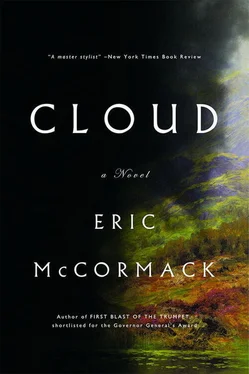“Oh, he exists all right,” Gordon said. “The rumour is he lost his nose because of syphilis. But your general confusion is quite natural. You’ve been through a lot and it’ll take time for you to be completely at ease. That’s what you’re here for.”
OFTEN THROUGHOUT this conversation he’d been glancing towards a doorway to his right. Now his eyes lit up as we heard the tapping of high heels on polished wood, followed by the entrance of a young woman in a blue silk dress.
Gordon Smith stood up and so did I.
“I’d like you to meet my daughter, Alicia,” he said.
The young woman held out her hand and shook mine lightly.
“How nice to meet you,” she said in a soft voice. Her eyes were dark brown, not blue like her father’s. But they were just as unflinching, looking me over quite frankly, the way you’d appraise a photograph.
For my own part, I was certainly appraising her, though I was trying not to make that too obvious. She was of middling height, with an oval face. She was carefully made up, with black mascara framing those brown eyes. Her hair was dark brown, too, and striking in the way it hung over the left side of her face, like a veil. The more I looked at her, the harder it was to spot her father in her aside from that quality of her eyes. She was one of those children whose physical resemblance to a parent isn’t all that obvious even when you see the two of them together.
I was about to make some such remark to Gordon when I saw he’d been watching me closely, as though anxious about my impression of his daughter.
I suddenly understood.
From perhaps the time of our very first meeting at the La Mancha mine, Gordon Smith had been assessing me not just as a potential employee, but as a possible husband for his only daughter.
I BEGAN, THEREFORE, to look quite differently at this Alicia Smith, who, after pouring herself a glass of wine at the cabinet, came and sat down on the couch opposite and made polite conversation.
I guessed she’d heard all about me. I, on the other hand, didn’t know much about her. Had she lived in Camberloo all her life, for example?
“Yes. I love it here,” she said.
“In fact, she’s always lived in this very house,” said Gordon Smith. “I had it built before she was born. It was meant to be my gift to her mother but she died without ever seeing it.”
They both smiled sadly at this private allusion.
“However,” said Gordon, “Alicia doesn’t mean she’s been confined solely to Camberloo. Right, Alicia?”
Thus prompted, she began to tell me more about herself, in the course of which I realized she’d had an altogether different kind of life from mine. She’d attended a private girls’ school in Toronto and spent a year at the Sorbonne studying fine art. And, of course, every year she’d go “roughing it” at their cottage in the north country, sailing on the Great Lakes, skiing in Vermont, or basking in the sun at their apartment in Key Biscayne.
Not that her entire life was play. She was a member of the board of the Camberloo Art Gallery where she spent several mornings a week as a volunteer. Gordon, it turned out, was a major supporter of the gallery. The muted paintings on the walls around us were part of the collection he was allowed to borrow.
I asked if she’d ever travelled with her father on any of his business trips.
She shook her head, and because of the head-shaking, I realized she kept that veil of hair over the left side of her face to partly cover some sort of discoloration on her cheek.
“I much prefer to stay here and look after the house,” she said.
“And I always look forward to coming home to her,” said Gordon Smith.
They looked at each other with great fondness.
Of course, I couldn’t help noticing that her account of her life had made no mention of a husband or boyfriend.
DINNER WAS SERVED in the dining room by an Asian maid who was also, I gathered, their cook and cleaning woman. They complimented her upon the main course — a dish that was one of Gordon’s favourites from his travels in the East. It consisted of tofu, eggs, shrimp, and rice done in various exotic spices.
I tried to look as though I enjoyed it.
The entire dinner took more than an hour, with short course after short course. The Smiths only pecked at them, as though this was more of a daily ritual than a means of sustenance.
I’d been feeling rather nervous, but the wine loosened my tongue and I did a lot of the talking, mainly about my life as a sailor and my experiences in Africa and South America. I wanted to be amusing, and they seemed amused. Even after the remnants of the meal were cleared away, we stayed at the table a while, drinking coffee and chatting.
Then Gordon Smith glanced over at Alicia, they nodded to each other, and she stood up. We stood too.
“I’ll leave you two now to talk business,” said Alicia. She kissed Gordon briefly on the cheek. She shook my hand again, perhaps a little more warmly than at our introduction.
“I’ve enjoyed meeting you,” she said. “I do hope you’ll visit us again.”
She seemed about the same age as me, so her enormous selfpossession impressed me all the more. I mumbled something to the effect that I’d no idea how long I’d be in Camberloo but I hoped I’d be invited to dinner again.
“I’m sure you will be,” she said. Then she left the dining room.
Gordon Smith now said, “Time for brandy and cigars.”
He led me into an adjoining room lined with bookshelves and let me have a look around. He called the room “the library” and indeed it was full of books, mostly matched sets of classical works as far as I could see — Plato and Shakespeare and Dickens and Tolstoy and so on — that looked as though they’d never been opened but were for decorative purposes. Near the fireplace, a smaller bookcase beside two comfortable armchairs with reading lights was clearly dedicated to books that were actually read. I glanced at a few of the titles: A History of Technology Throughout the Ages, The Hydraulic Deep Earth Pump, Clear Thinking in a Complex World , and Business: Strategic Approaches . I didn’t notice any fiction. A number of what appeared to be catalogues from galleries and large-sized art books were lying flat on the bottom shelves.
When the maid came in carrying a tray with a bottle and glasses and a box of cigars, we sat down in the armchairs.
She placed the tray on a little table near Gordon and silently retreated. He poured two sizable brandies then picked out two cigars. He snipped the tops off and handed me one.
“Cuban,” he said.
He lit them, we puffed, then we sipped the brandies. It was a most enjoyable sensation.
“Harry, it really is a pleasure to have you here,” he said.
We clinked glasses, puffed and sipped some more, then Gordon put down his glass.
“You remember when I came to see you in the hospital?” he said. “As I told you then, it wasn’t simply an act of kindness. I’d been looking for someone I could have complete trust in to represent the firm overseas. We’re doing very well, but I ought to be spending the bulk of my time here in Camberloo dealing with our expansion plans, not gallivanting around the world. In addition my doctor says my heart isn’t as good as it used to be and it’s time I cut out the rigours of long-distance travel.” The hawk eyes narrowed on me. “When I met you, I came to the conclusion that you were a fine young man, wasting your talents in those mining camps. I really think you could do a great job for us.”
I’d been thinking about this moment for weeks now and answered him carefully, letting him know I was very flattered by his interest in me. But, equally, I didn’t want him to put his faith in the wrong man. How could someone as ignorant as I was— even of basic science — be of any use as the representative of a highly technical, specialized firm like Smith’s Pumps?
Читать дальше











